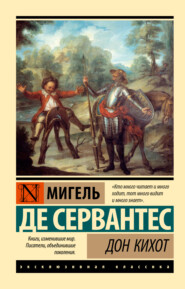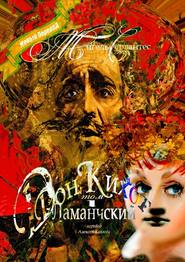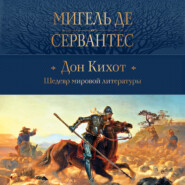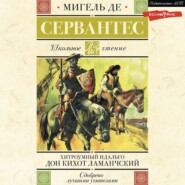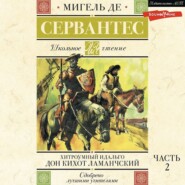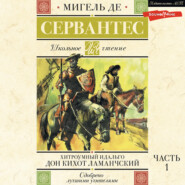По всем вопросам обращайтесь на: info@litportal.ru
(©) 2003-2025.
✖
The Exemplary Novels of Cervantes
Настройки чтения
Размер шрифта
Высота строк
Поля
"The first word she uttered was the question, 'Do you know me, Signor?' I replied, 'No, lady! I have not been so fortunate as ever before to have seen so much beauty.' 'Unhappy is she,' returned the lady, 'to whom heaven has given it for her misfortune. But, Signor, this is not the time to praise my beauty, but to mourn my distress. By all that you most revere, I entreat you to leave me shut up here, and let no one behold me, while you return in all haste to the place where you found me, and see if there be any persons fighting there. Yet do not take part either with one side or the other. Only separate the combatants, for whatever injury may happen to either, must needs be to the increase of my own misfortunes.' I then left her as she desired," continued Don Antonio, "and am now going to put an end to any quarrel which may arise, as the lady has commanded me."
"Have you anything more to say?" inquired Don Juan.
"Do you think I have not said enough," answered Don Antonio, "since I have told you that I have now in my chamber, and hold under my key, the most wonderful beauty that human eyes have ever beheld."
"The adventure is a strange one, without doubt," replied Don Juan, "but listen to mine;" and he instantly related to his friend all that had happened to him. He told how the newly-born infant was then in their house, and in the care of their housekeeper, with the orders he had given as to changing its rich habits for others less remarkable, and for procuring a nurse from the nearest midwife, to meet the present necessity. "As to the combat you come in quest of," he added, "that is already ended, and peace is made." Don Juan further related that he had himself taken part in the strife; and concluded by remarking, that he believed those whom he had found engaged were all persons of high quality, as well as great courage.
Each of the Spaniards was much surprised at the adventure of the other, and they instantly returned to the house to see what the lady shut up there might require. On the way, Don Antonio told Don Juan that he had promised the unknown not to suffer any one to see her; assuring her that he only would enter the room, until she should herself permit the approach of others.
"I shall nevertheless do my best to see her," replied Don Juan; "after what you have said of her beauty, I cannot but desire to do so, and shall contrive some means for effecting it."
Saying this they arrived at their house, when one of their three pages, bringing lights, Don Antonio cast his eyes on the hat worn by Don Juan, and perceived that it was glittering with diamonds. Don Juan took it off, and then saw that the lustre of which his companion spoke, proceeded from a very rich band formed of large brilliants. In great surprise, the friends examined the ornament, and concluded that if all the diamonds were as precious as they appeared to be, the hat must be worth more than two thousand ducats. They thus became confirmed in the conviction entertained by Don Juan, that the persons engaged in the combat were of high quality, especially the gentleman whose part he had taken, and who, as he now recollected, when bidding him take the hat, and keep it, had remarked that it was not unknown.
The young men then commanded their pages to retire, and Don Antonio, opening the door of his room, found the lady seated on his bed, leaning her cheek on her hand, and weeping piteously. Don Juan also having approached the door, the splendour of the diamonds caught the eye of the weeping lady, and she exclaimed, "Enter, my lord duke, enter! Why afford me in such scanty measure the happiness of seeing you; enter at once, I beseech you."
"Signora," replied Don Antonio, "there is no duke here who is declining to see you."
"How, no duke!" she exclaimed. "He whom I have just seen is the Duke of Ferrara; the rich decoration of his hat does not permit him to conceal himself."
"Of a truth, Signora, he who wears the hat you speak of is no duke; and if you please to undeceive yourself by seeing that person, you have but to give your permission, and he shall enter."
"Let him do so," said the lady; "although, if he be not the duke, my misfortune will be all the greater."
Don Juan had heard all this, and now finding that he was invited to enter, he walked into the apartment with his hat in his hand; but he had no sooner placed himself before the lady than she, seeing he was not the person she had supposed, began to exclaim, in a troubled voice and with broken words, "Ah! miserable creature that I am, tell me, Signor – tell me at once, without keeping me in suspense, what do you know of him who owned that sombrero? How is it that he no longer has it, and how did it come into your possession? Does he still live, or is this the token that he sends me of his death? Oh! my beloved, what misery is this! I see the jewels that were thine. I see myself shut up here without the light of thy presence. I am in the power of strangers; and if I did not know that they were Spaniards and gentlemen, the fear of that disgrace by which I am threatened would already have finished my life."
"Calm yourself, madam," replied Don Juan, "for the master of this sombrero is not dead, nor are you in a place where any increase to your misfortunes is to be dreaded. We think only of serving you, so far as our means will permit, even to the exposing our lives for your defence and succour. It would ill become us to suffer that the trust you have in the faith of Spaniards should be vain; and since we are Spaniards, and of good quality – for here that assertion, which might otherwise appear arrogant, becomes needful – be assured that you will receive all the respect which is your due."
"I believe you," replied the lady; "but, nevertheless, tell me, I pray you, how this rich sombrero came into your possession, and where is its owner? who is no less a personage than Alfonso d'Este, Duke of Ferrara."
Then Don Juan, that he might not keep the lady longer in suspense, related to her how he had found the hat in the midst of a combat, in which he had taken the part of a gentleman, who, from what she had said, he could not now doubt to be the Duke of Ferrara. He further told her how, having lost his own hat in the strife, the gentleman had bidden him keep the one he had picked up, and which belonged, as he said, to a person not unknown; that neither the cavalier nor himself had received any wound; and that, finally, certain friends or servants of the former had arrived, when he who was now believed to be the duke had requested Don Juan to leave him in that place, where he desired for certain reasons to remain.
"This, madam," concluded Don Juan, "is the whole history of the manner in which the hat came into my possession; and for its master, whom you suppose to be the Duke of Ferrara, it is not an hour since I left him in perfect safety. Let this true narration suffice to console you, since you are anxious to be assured that the Duke is unhurt."
To this the lady made answer, "That you, gentlemen, may know how much reason I have to inquire for the duke, and whether I need be anxious for his safety, listen in your turn with attention, and I will relate what I know not yet if I must call my unhappy history."
While these things were passing, the housekeeper of Don Antonio and Don Juan was occupied with the infant, whose mouth she had moistened with honey, and whose rich habits she was changing for clothes of a very humble character. When that was done, she was about to carry the babe to the house of the midwife, as Don Juan had recommended, but as she was passing with it before the door of the room wherein the lady was about to commence her history, the little creature began to cry aloud, insomuch that the lady heard it. She instantly rose to her feet, and set herself to listen, when the plaints of the infant arrived more distinctly to her ear.
"What child is this, gentlemen?" said she, "for it appears to be but just born."
Don Juan replied, "It is a little fellow who has been laid at the door of our house to-night, and our servant is about to seek some one who will nurse it."
"Let them bring it to me, for the love of God!" exclaimed the lady, "for I will offer that charity to the child of others, since it has not pleased Heaven that I should be permitted to nourish my own."
Don Juan then called the housekeeper, and taking the infant from her arms he placed it in those of the lady, saying, "Behold, madam, this is the present that has been made to us to-night, and it is not the first of the kind that we have received, since but few months pass wherein we do not find such God-sends hooked on to the hinges of our doors."
The lady had meanwhile taken the infant into her arms, and looked attentively at its face, but remarking the poverty of its clothing, which was, nevertheless, extremely clean, she could not restrain her tears. She cast the kerchief which she had worn around her head over her bosom, that she might succour the infant with decency, and bending her face over that of the child, she remained long without raising her head, while her eyes rained torrents of tears on the little creature she was nursing.
The babe was eager to be fed, but finding that it could not obtain the nourishment it sought, the lady returned the babe to Don Juan, saying, "I have vainly desired to be charitable to this deserted infant, and have but shown that I am new to such matters. Let your servants put a little honey on the lips of the child, but do not suffer them to carry it through the streets at such an hour; bid them wait until the day breaks, and let the babe be once more brought to me before they take it away, for I find a great consolation in the sight of it."
Don Juan then restored the infant to the housekeeper, bidding her take the best care she could of it until daybreak, commanding that the rich clothes it had first worn should be put on it again, and directing her not to take it from the house until he had seen it once more. That done, he returned to the room; and the two friends being again alone with the beautiful lady, she said, "If you desire that I should relate my story, you must first give me something that may restore my strength, for I feel in much need of it." Don Antonio flew to the beaufet for some conserves, of which the lady ate a little; and having drunk a glass of water, and feeling somewhat refreshed, she said, "Sit down, Signors, and listen to my story."
The gentlemen seated themselves accordingly, and she, arranging herself on the bed, and covering her person with the folds of her mantle, suffered the veil which she had kept about her head to fall on her shoulders, thus giving her face to view, and exhibiting in it a lustre equal to that of the moon, rather of the sun itself, when displayed in all its splendour. Liquid pearls fell from her eyes, which she endeavoured to dry with a kerchief of extraordinary delicacy, and with hands so white that he must have had much judgment in colour who could have found a difference between them and the cambric. Finally, after many a sigh and many an effort to calm herself, with a feeble and trembling voice, she said —
"I, Signors, am she of whom you have doubtless heard mention in this city, since, such as it is, there are few tongues that do not publish the fame of my beauty. I am Cornelia Bentivoglio, sister of Lorenzo Bentivoglio; and, in saying this, I have perhaps affirmed two acknowledged truths, – the one my nobility, and the other my beauty. At a very early age I was left an orphan to the care of my brother, who was most sedulous in watching over me, even from my childhood, although he reposed more confidence in my sentiments of honour than in the guards he had placed around me. In short, kept thus between walls and in perfect solitude, having no other company than that of my attendants, I grew to womanhood, and with me grew the reputation of my loveliness, bruited abroad by the servants of my house, and by such as had been admitted to my privacy, as also by a portrait which my brother had caused to be taken by a famous painter, to the end, as he said, that the world might not be wholly deprived of my features, in the event of my being early summoned by Heaven to a better life.
"All this might have ended well, had it not chanced that the Duke of Ferrara consented to act as sponsor at the nuptials of one of my cousins; when my brother permitted me to be present at the ceremony, that we might do the greater honour to our kinswoman. There I saw and was seen; there, as I believe, hearts were subjugated, and the will of the beholders rendered subservient; there I felt the pleasure received from praise, even when bestowed by flattering tongues; and, finally, I there beheld the duke, and was seen by him; in a word, it is in consequence of this meeting that you see me here.
"I will not relate to you, Signors (for that would needlessly protract my story), the various stratagems and contrivances by which the duke and myself, at the end of two years, were at length enabled to bring about that union, our desire for which had received birth at those nuptials. Neither guards, nor seclusion, nor remonstrances, nor human diligence of any kind, sufficed to prevent it, and we were finally made one; for without the sanction due to my honour, Alfonso would certainly not have prevailed. I would fain have had him publicly demand my hand from my brother, who would not have refused it; nor would the duke have had to excuse himself before the world as to any inequality in our marriage, since the race of the Bentivogli is in no manner inferior to that of Este; but the reasons which he gave for not doing as I wished appeared to me sufficient, and I suffered them to prevail.
"The visits of the duke were made through the intervention of a servant, over whom his gifts had more influence than was consistent with the confidence reposed in her by my brother. After a time I perceived that I was about to become a mother, and feigning illness and low spirits, I prevailed on Lorenzo to permit me to visit the cousin at whose marriage it was that I first saw the duke; I then apprised the latter of my situation, letting him also know the danger in which my life was placed from that suspicion of the truth which I could not but fear that Lorenzo must eventually entertain.
"It was then agreed between us, that when the time for my travail drew near, the duke should come, with certain of his friends, and take me to Ferrara, where our marriage should be publicly celebrated. This was the night on which I was to have departed, and I was waiting the arrival of Alfonso, when I heard my brother pass the door with several other persons, all armed, as I could hear, by the noise of their weapons. The terror caused by this event was such as to occasion the premature birth of my infant, a son, whom the waiting-woman, my confidant, who had made all ready for his reception, wrapped at once in the clothes we had provided, and gave at the street-door, as she told me, to a servant of the duke. Soon afterwards, taking such measures as I could under circumstances so pressing, and hastened by the fear of my brother, I also left the house, hoping to find the duke awaiting me in the street. I ought not to have gone forth until he had come to the door; but the armed band of my brother, whose sword I felt at my throat, had caused me such terror that I was not in a state to reflect. Almost out of my senses I came forth, as you behold me; and what has since happened you know. I am here, it is true, without my husband, and without my son; yet I return thanks to Heaven which has led me into your hands – for from you I promise myself all that may be expected from Spanish courtesy, reinforced, as it cannot but be in your persons, by the nobility of your race."
Having said this, the lady fell back on the bed, and the two friends hastened to her assistance, fearing she had again fainted. But they found this not to be the case; she was only weeping bitterly. Wherefore Don Juan said to her, "If up to the present moment, beautiful lady, my companion Don Antonio, and I, have felt pity and regret for you as being a woman, still more shall we now do so, knowing your quality; since compassion and grief are changed into the positive obligation and duty of serving and aiding you. Take courage, and do not be dismayed; for little as you are formed to endure such trials, so much the more will you prove yourself to be the exalted person you are, as your patience and fortitude enable you to rise above your sorrows. Believe me, Signora, I am persuaded that these extraordinary events are about to have a fortunate conclusion; for Heaven can never permit so much beauty to endure permanent sorrow, nor suffer your chaste purposes to be frustrated. Go now to bed, Signora, and take that care of your health of which you have so much need; there shall presently come to wait on you a servant of ours, in whom you may confide as in ourselves, for she will maintain silence respecting your misfortunes with no less discretion than she will attend to all your necessities."
"The condition in which I find myself," replied the lady, "might compel me to the adoption of more difficult measures than those you advise. Let this woman come, Signors; presented to me by you, she cannot fail to be good and serviceable; but I beseech you let no other living being see me."
"So shall it be," replied Don Antonio; and the two friends withdrew, leaving Cornelia alone.
Don Juan then commanded the housekeeper to enter the room, taking with her the infant, whose rich habits she had already replaced. The woman did as she was ordered, having been previously told what she should reply to the questions of the Signora respecting the infant she bore in her arms Seeing her come in, Cornelia instantly said, "You come in good time, my friend; give me that infant, and place the light near me."
The servant obeyed; and, taking the babe in her arms, Cornelia instantly began to tremble, gazed at him intently, and cried out in haste, "Tell me, good woman, is this child the same that you brought me a short time since?" "It is the same, Signora," replied the woman. "How is it, then, that his clothing is so different? Certainly, dame housekeeper, either these are other wrappings, or the infant is not the same." "It may all be as you say," began the old woman. "All as I say!" interrupted Cornelia, "how and what is this? I conjure you, friend, by all you most value, to tell me whence you received these rich clothes; for my heart seems to be bursting in my bosom! Tell me the cause of this change; for you must know that these things belong to me, if my sight do not deceive me, and my memory have not failed. In these robes, or some like them, I entrusted to a servant of mine the treasured jewel of my soul! Who has taken them from him? Ah, miserable creature that I am! who has brought these things here? Oh, unhappy and woeful day!"
Don Juan and Don Antonio, who were listening to all this, could not suffer the matter to go further, nor would they permit the exchange of the infant's dress to trouble the poor lady any longer. They therefore entered the room, and Don Juan said, "This infant and its wrappings are yours, Signora;" and immediately he related from point to point how the matter had happened. He told Cornelia that he was himself the person to whom the waiting woman had given the child, and how he had brought it home, with the orders he had given to the housekeeper respecting its change of clothes, and his motives for doing so. He added that, from the moment when she had spoken of her own infant, he had felt certain that this was no other than her son; and if he had not told her so at once, that was because he feared the effects of too much gladness, coming immediately after the heavy grief which her trials had caused her.
The tears of joy then shed by Cornelia were many and long-continued; infinite were the acknowledgments she offered to Heaven, innumerable the kisses she lavished on her son, and profuse the thanks which she offered from her heart to the two friends, whom she called her guardian angels on earth, with other names, which gave abundant proof of her gratitude. They soon afterwards left the lady with their housekeeper, whom they enjoined to attend her well, and do her all the service possible – having made known to the woman the position in which Cornelia found herself, to the end that she might take all necessary precautions, the nature of which, she, being a woman, would know much better than they could do. They then went to rest for the little that remained of the night, intending to enter Cornelia's apartment no more, unless summoned by herself, or called thither by some pressing need.
The day having dawned, the housekeeper went to fetch a woman, who agreed to nurse the infant in silence and secrecy. Some hours later the friends inquired for Cornelia, and their servant told them that she had rested a little. Don Juan and Don Antonio then went to the Schools. As they passed by the street where the combat had taken place, and near the house whence Cornelia had fled, they took care to observe whether any signs of disorder were apparent, and whether the matter seemed to be talked of in the neighbourhood: but they could hear not a word respecting the affray of the previous night, or the absence of Cornelia. So, having duly attended the various lectures, they returned to their dwelling.
The lady then caused them to be summoned to her chamber; but finding that, from respect to her presence, they hesitated to appear, she replied to the message they sent her, with tears in her eyes, begging them to come and see her, which she declared to be now the best proof of their respect as well as interest; since, if they could not remedy, they might at least console her misfortunes.
Thus exhorted, the gentlemen obeyed, and Cornelia received them with a smiling face and great cordiality. She then entreated that they would do her the kindness to walk about the city, and ascertain if anything had transpired concerning her affairs. They replied, that they had already done so, with all possible care, but that not a word had been said reacting the matter.
At this moment, one of the three pages who served the gentlemen approached the door of the room telling his masters from without, that there was then at the street door, attended by two servants, a gentleman, who called himself Lorenzo Bentivoglio, and inquired for the Signor Don Juan de Gamboa. Hearing this message, Cornelia clasped her hands, and placing them on her mouth, she exclaimed, in a low and trembling voice, while her words came with difficulty through those clenched fingers, "It is my brother, Signors! it is my brother! Without doubt he has learned that I am here, and has come to take my life. Help and aid, Signors! help and aid!"
"Calm yourself, lady," replied Don Antonio; "you are in a place of safety, and with people who will not suffer the smallest injury to be offered you. The Signor Don Juan will go to inquire what this gentleman demands, and I will remain to defend you, if need be, from all disturbance."
Don Juan prepared to descend accordingly, and Don Antonio, taking his loaded pistols, bade the pages belt on their swords, and hold themselves in readiness for whatever might happen. The housekeeper, seeing these preparations began to tremble, – Cornelia, dreading some fearful result was in grievous terror, – Don Juan and Don Antonio alone preserved their coolness.
Arrived at the door of the house, Don Juan found Don Lorenzo, who, coming towards him, said, "I entreat your Lordship" – for such is the form of address among Italians – "I entreat your Lordship to do me the kindness to accompany me to the neighbouring church; I have to speak to you respecting an affair which concerns my life and honour."
"Very willingly," replied Don Juan. "Let us go, Signor, wherever you please."
They walked side by side to the church, where they seated themselves on a retired bench, so as not to be overheard. Don Lorenzo was the first to break silence.
"Signor Spaniard," he said, "I am Lorenzo Bentivoglio; if not of the richest, yet of one of the most important families belonging to this city; and if this seem like boasting of myself, the notoriety of the fact may serve as my excuse for naming it. I was left an orphan many years since, and to my guardianship was left a sister, so beautiful, that if she were not nearly connected with me, I might perhaps describe her in terms that, while they might seem exaggerated, would yet not by any means do justice to her attractions. My honour being very dear to me, and she being very young, as well as beautiful, I took all possible care to guard her at all points; but my best precautions have proved vain; the self-will of Cornelia, for that is her name, has rendered all useless. In a word, and not to weary you – for this story might become a long one, – I will but tell you, that the Duke of Ferrara, Alfonso d'Este, vanquishing the eyes of Argus by those of a lynx, has rendered all my cares vain, by carrying off my sister last night from the house of one of our kindred; and it is even said that she has already become a mother.
"The misfortune of our house was made known to me last night, and I instantly placed myself on the watch; nay, I met and even attacked Alfonso, sword in hand; but he was succoured in good time by some angel, who would not permit me to efface in his blood the stain he has put upon me. My relation has told me, (and it is from her I have heard all,) that the duke deluded my sister, under a promise to make her his wife; but this I do not believe, for, in respect to present station and wealth, the marriage would not be equal, although, in point of blood, all the world knows how noble are the Bentivogli of Bologna. What I fear is, that the duke has done, what is but too easy when a great and powerful Prince desires to win a timid and retiring girl: he has merely called her by the tender name of wife, and made her believe that certain considerations have prevented him from marrying her at once, – a plausible pretence, but false and perfidious.






